 Fayetteville, Georgia. Tell people you are going there and some want to talk about the popular series “The Walking Dead” filmed in nearby Senoia. In fact, knowing that the Ganus family lived in Fayetteville for many years, someone recommended that I watch the series so I could see the area where my family had lived. So, I gave it a try, but I didn’t last ten minutes. Apparently, zombies are not my thing, but being a genealogist, dead people are.
Fayetteville, Georgia. Tell people you are going there and some want to talk about the popular series “The Walking Dead” filmed in nearby Senoia. In fact, knowing that the Ganus family lived in Fayetteville for many years, someone recommended that I watch the series so I could see the area where my family had lived. So, I gave it a try, but I didn’t last ten minutes. Apparently, zombies are not my thing, but being a genealogist, dead people are.
On our October trip to Georgia, one morning we drove from Carrollton where we were staying, to Fayetteville to see the area where the James (Gur)Ganus family had lived for nearly 30 years.
Driving through North Georgia helped me better understand a few things about my ancestors and their moves in the 1800s in Georgia.
For instance, the distance from Fayetteville to Carrollton didn’t seem like much when viewed on a map, but driving the fifty miles brought new perspective as I considered the difficulty of taking that same trip in wagons through the dense trees while also navigating either through or around the numerous rivers, streams, ponds, and lakes. Driving the distance helped me understand at a different level that the 76-mile move from Fayetteville to Cedartown that James’ son, John made about 1850 had not been a casual event, but an intentional move.
I loved seeing the homes tucked back in among the trees and the numerous churches and cemeteries everywhere we drove. I wondered if James’ son, John Ganus heart had ached for the beauty of Georgia when he and his family moved to the flat wide-open farmland of the San Luis Valley, Colorado in 1886, and then onto the plains of Oklahoma about ten years later.
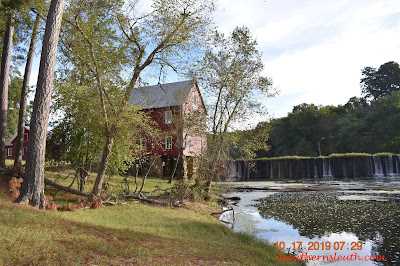 |
| Starrs Mill Fayette County |
A few miles from Fayetteville, we stopped at the beautiful Starrs Mill on Whitewater Creek. It was peaceful and serene there. Although the current mill isn’t the original mill that was built in 1825, I wondered if the Ganus family had reason to go to the original mill or if they knew the family who owned it.
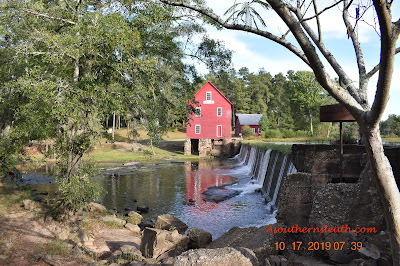 |
| Starrs Mill, Fayette County |
James and Betsy (McCluskey) Gurganus moved to Fayette County in time to be included in the 1840 census. I’ve always wondered what the push or pull was that influenced that move. Prior to Fayetteville, James and Betsy had lived in Bibb County where James’ father David Gurganus and his stepmother Rebecca were living.
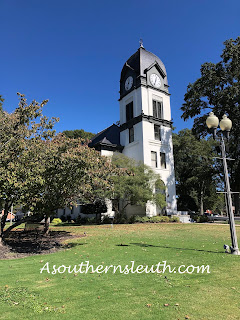 |
| Fayette County Georgia Court House |
The year 1838 was a pivotal year for the Gurganus family. That year, Mary Ellen (Gurganus) Pratt, sister to my 3rd great grandfather, James, was murdered. I shared that story HERE. That same year, James’s brother, David was arrested in an unrelated incident, a story I shared HERE.
Is it just a coincidence or is it possible that either or both scandals contributed to James’ move at about that same time and also contributed to the shortening of his name from Gurganus to Ganus?
Fayette County was created in 1825, so it was a relatively new county when the Ganus family first moved there. At that time the population was around 7,500 people and, “….there were two churches, two schools, three stores, five barrooms, a printing office, and a Division of the Sons of Temperance (or there probably would have been more barrooms).” (1) Over the next thirty years, while Georgia continued to enlarge its borders and grow, James and Betsy worked on their farm and raised their children, ten in all.
The Ganus family was living in Fayette County in 1862 when smallpox broke out. Impacted families who contracted the disease were quarantined as Fayetteville struggled to control the outbreak.
The Ganus family was also in Fayette County when the War between the States broke out and they watched four sons go off to war, and one never came home. Although no large battles took place in Fayette County, it was the scene for several skirmishes and individuals have recorded some of the frightening experiences they experienced when Union soldiers came through.
The Ganuses would have been among those who endured the challenges experienced during the years of reconstruction when basic commodities were scarce. “In 1867, the State of Kentucky sent corn and bacon to this (Fayette) County. The Justices wrote . . . corn and bacon will be contributed to the suffering citizens of our County who are unable to support and help themselves.“(2)
By 1870, Elizabeth had passed away and James moved in with their daughter Mary and her husband Burton Cook and that is the last record for James. Although I feel confident that both were buried somewhere in Fayette County, there is no record of where either James or Betsy was laid to rest.
So this is my tie to Fayette County and why I was excited to pay a visit to The Fayette County Historical Society while there. The volunteers were so kind and eager to help.
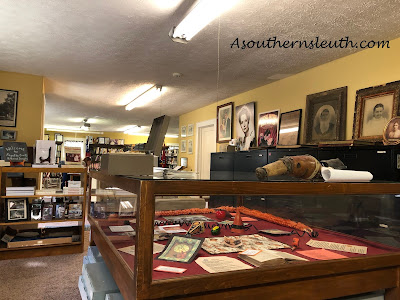 |
| Fayette County Historical Society |
 |
| Fayette County Marriage Records, Book C |
I was thrilled to learn that among their collection were marriage record books. James and Betsy’s oldest child, Mary married Burton Cook in nearby Dekalb County and their son, John, my second great grandfather married Olivia Rainwater in Cedartown, Polk County. However, their children Margaret and David both married in Fayette County. Even though I already had the dates of their marriages, I loved being able to view their entries in the actual book.
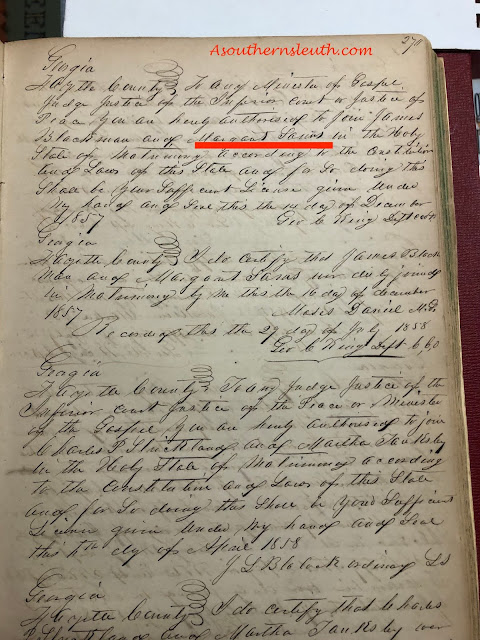 |
| Margaret Ganus and James Blackmon’s marriage entry |
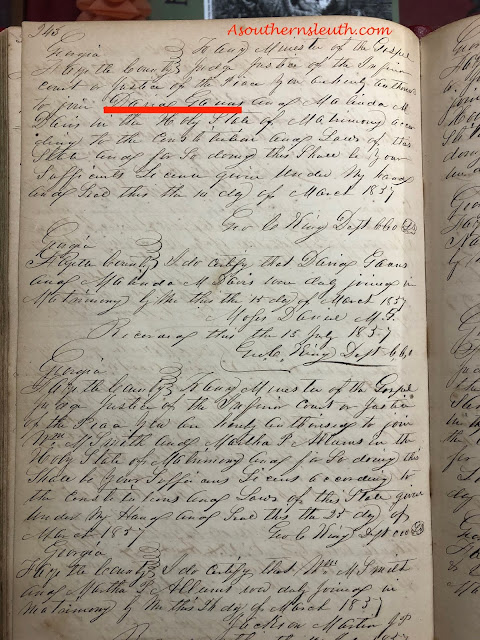 |
| David Ganus and Malinda M. Davis’ marriage entry |
Not only did I not see any zombies while there, but I also didn’t find any new information, yet I was so glad to have visited. A lot can be said about the experience we have of seeing the area where our ancestors lived and the feelings we experience as a result as well as the increase of understanding we gain in the process.
It was hard to leave Fayetteville that day and I couldn’t shake that feeling that I had unfinished business there. Hopefully, someday I will return.
1. The History of Fayette County 1821-1971 published by the Fayette County Historical Society, Inc., First Edition, December 1977, The Fayette County Historical Society, p. 20

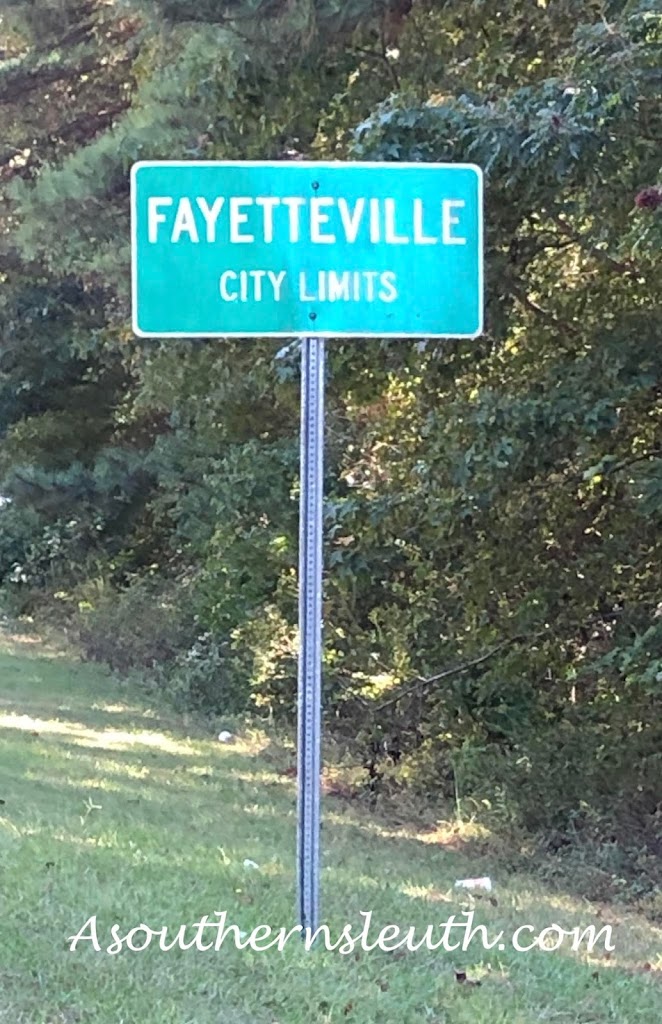

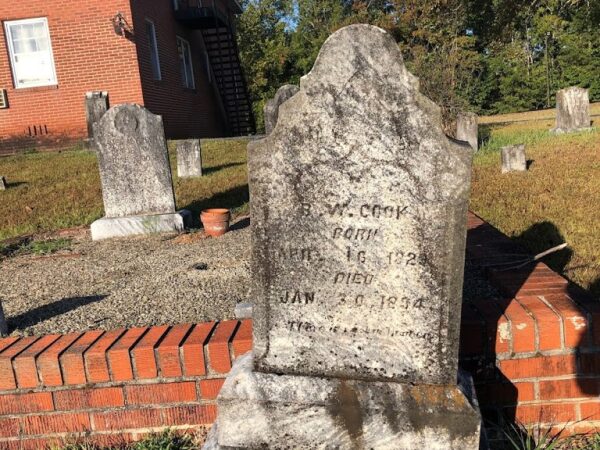

An amazing trip
You and I think the same way about BEING in a place where our ancestors had been. Did they shop in that old store building? Did they follow an unimproved version of this road or was there another way?